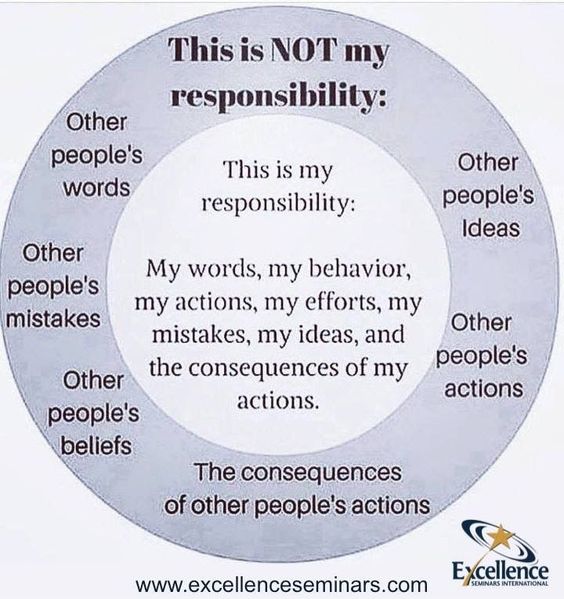Boundaries- Do you have them?
The diagram is a great resource from Excellence Seminars, which I feel highlights what we get drawn into on a daily basis, but when we separate it out it’s easy to see how we can feel overloaded if we are engaging in other people’s behaviours by taking them on as our own.
This leads me to help you to consider boundaries. Do you have any?
- Do you give your all to your friends, boss, partner, family but feel they are offering you nothing back?
- Is there one person (or more) in your life that leaves you feeling drained?
- Do people expect a lot from you and it leaves you wondering why?
- Do you find yourself in situations wondering ‘Shouldn’t they be doing this, not me?’
If the answer is Yes to any or all of these questions, then it is likely you have trouble setting and maintaining boundaries.
I stress self-care to all my clients and boundary-setting can be a really rewarding way to free up your time and in itself is a form of self-care.
Saying No to people you usually say Yes to can cause anxiety and guilt because suddenly you aren’t living up to the standards that you expect of yourself and what you perceive the other person expects from you. In both cases, it’s a level/ standard you have set, and by continuing with that habit/ behaviour it becomes normal, but it’s likely you don’t enjoy doing the things you are doing, you hate the habit, but it’s now expected. If you are going to feel guilt and anxiety anyway in the situation (for carrying it out) imagine the same feelings but not having to do the behaviour that’s draining you week in week out. In saying No, you can achieve this.
For example: Helping out a demanding sibling with babysitting, progresses from a favour to a weekly event, progressing from a weekday to a weekend too. You want time to yourself; they don’t help you out and often say no to you when you need help; you want your weekends back but you want to be supportive and be seen to be helpful. Not having a social life is becoming damaging and you feel burned-out.
In saying Yes each time, you continue to miss out on your own life, start to feel used, and your relationship with your sibling is becoming draining and negative. The thought of saying ‘No’ fills you with guilt and sadness but you have had enough.
In saying No, you feel guilt and sadness in letting them down, but you have your weekend back to yourself, you can do the things you want to do and you get your life back on track. In saying No when you are unable to help, the expectation of being ‘on- call’ is lowered by yourself and the sibling. You can change your own behaviours by looking at what is not helpful to YOU.
There is still guilt but you put yourself first in this situation- this can feel uncomfortable at first if you are a person who gives often to others, but your own state of mind is more important than other people’s if you are suffering. You can’t help others if you are struggling too. It is important to have boundaries in place for this reason and good way of going about this is considering:
- Do I have a good enough ‘me time’ balance in my life?
- What behaviours from other people am I prepared to tolerate?
- What do I find offensive in the people who are using up my resources?
- Who is draining me right now?
- What can I stop doing that I don’t enjoy doing for others?
These are general examples and you might be in a situation where you are a sole carer, in which case these can still be a consideration but it is appreciated that the situation for you is far more complex, which could require respite arrangements as well as accessing a counsellor to assist you with having time to work out your thoughts.
I hope this prompts you to consider your own boundaries today and to begin to evaluate your own relationships with other people, but more importantly your relationship with yourself.

1 Comment
Add Comment